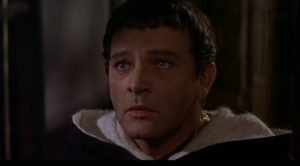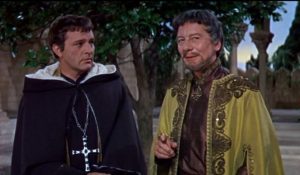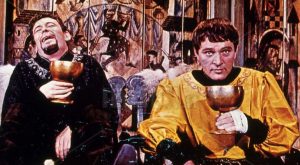
A decidedly off-balance historical character study, Becket concerns the friendship between Thomas Becket and King Henry II. Taking place within 100 years of the Battle of Hastings, and the conquering of the lowly Saxons by the haughty Normans, the film does not shy from showing the utter corruption that permeates the halls of power. Here, the primary conflict is between the throne of England in its debauchery, and the church, with its compromised morality. The characters, even while wearing robes of power, stink to highest heaven in every sense. While protected by their power, they freely admit the moral sewer they occupy, and serve their gluttonous appetites with aplomb. This is a rare film in that the king and pope are neither moustache-twirling villains, nor wise saints. Here, absolute power allows the veneer of quality to drip away, and we can be most thankful for this lack of varnish.
The story is a familiar one, with the intrigue of the courts as loyalties change, and differing parties maneuver for power. The direction is somewhat wooden, but Peter Glenville probably thought it best to stay out of the way of the stars. Fortunately, this is a ship captained by a sharp screenplay, and powered by two of the greatest actors of our time, or indeed any time. Peter O’Toole rips into the script as if he invented the art of acting, and belts out some ripe dialogue worthy of Withnail. Richard Burton is always at his best when reserved, and this is no exception. John Gielgud, miscast as King Louis of France, makes the best of his brief screen appearance with a jovial performance. I suppose there is no getting around the fact that a French actor gets into a film only if they play a pervert or psychopath who happens to be French — unless of course the director is French. Otherwise, a normal French character will be British. Eddie Izzard dramatized this best: “My name is Pierre “. “I have come from Paris to have sex with your family.” I digress.

The conflict is centered on Becket and Henry, close friends who spent their youth wenching and drinking, servant and king, but friends foremost. There are layers below this, as Henry clearly revels in his lust for living, and more than a little affection for his servant Becket. His performance has range, from cunning to childish, and his motivations are clear from the outset. Unable to consummate his love for his fellow man, he drowns his desires in women. He doesn’t really like women, and treats them as so much chattel. He saves his greatest venom for his queen, whom he could do without in an instant: “Your body, madam, was a desert that duty forced me to wander in alone. But you have never been a wife to me!”
His empress, observing his extreme grief when Becket turns against the power of the throne, notes: You have an obsession about him that is unhealthy and unnatural! Quite. While nailing a peasant girl to the wall, his eyes are clearly fixed on his man, the love of his life. And when he loses his love, he despairs unendingly.
Becket is much more of an enigma, and his motivations are somewhat elusive. He clearly relishes the company of his king, but is not entirely comfortable with his attentions. He will help bathe his king, but he hesitates, and not only because he is clearly not attracted in kind. He is a Saxon, one of the conquered, requiring him to straddle the gulf between honor and collaboration. He wears his compromises poorly, and longs for a simpler, honorable way of living. The king loves the absolute power afforded to him, granted by God, and uses it against everyone in sight. Henry demands the body of a peasant girl (he refers to her as “it”), to be delivered to his chambers, and Becket uncomfortably lets her go free. Becket tires of his lustful friend, and this comes to a head when his honor, or utter lack thereof, is challenged by a final debauched betrayal by Henry. Henry challenges his servants’ loyalty by demanding Becket’s mistress. This seems finally to provoke him into becoming his own man.

On the surface, this appears to be an obnoxious king versus a dignified politician, but this is no simple hero-and-villain chemistry. Henry trusts his friend, and expects his love to be returned. When he promotes his friend to positions of increasing power within the crown and church, he is shocked when Becket appears to turn against him, in effect taking his new job rather seriously. And since his only love is for his job, and not his closeted king, he is prepared to see his appointed task through to the bitter end. Becket is, at his core, ascetic, which makes him seem devoid of real ambition. When he is installed as an archbishop, his talk of God and purity of spirit seem too sanctimonious; too rapid a rebirth for this cynic. Revenge, emptiness, disgust; virtually any emotion could explain his actions. Burton’s performance is fiery, when necessary, but his cards are held close to the vest. This creates an unease in the viewer without any concise explanation for why these men do what they do.
Even if you are not in the mood to delve into the odd relationship between the king and his servant, you will feast upon the words of King Henry II, particularly if you are a fan of O’Toole’s character in The Ruling Class:
“Let us drink, gentlemen. Let us drink, till we roll under the table in vomit and oblivion.”
“Listen, now, to the droppings of the greatest brain of our day.”
“God rest his soul … he will be more of a use to God then he ever was to me.”
“No wonder I shun your bed — it is not amusing to make love to one’s own widow.”
Queen: “I gave you my youth and your children!”
Henry II: “I don’t LIKE my children! And as for your youth, that withered flower, pressed between the pages of a hymnal since you were 12 years old, with its watery blood and stale, insipid scent, you can bid farewell without a tear.”

Even while Becket is adorned with holy symbols, locked in what he sees as a struggle to force honor upon the king, he never seems convinced that his actions will bring about justice, peace, or even equality between Normans and Saxons. As his assistant makes clear to him, if the Saxons were in power, the injustices would be identical. All Becket does know is that one must carry through one’s duty to its conclusion — perhaps that is the only clear honor possible in a corrupt world.